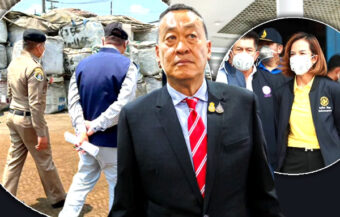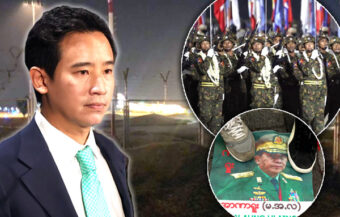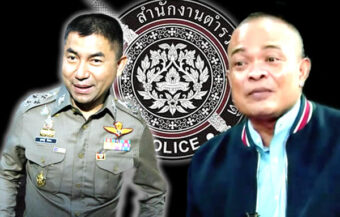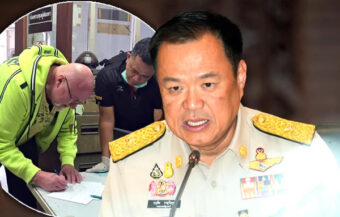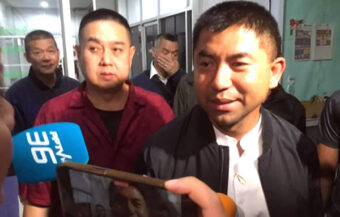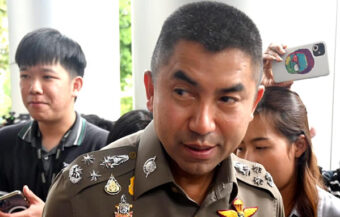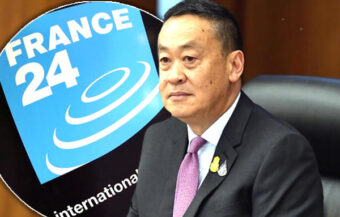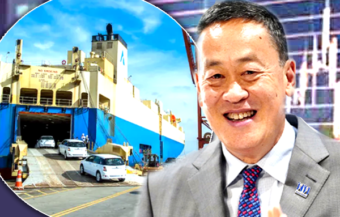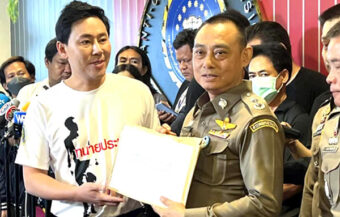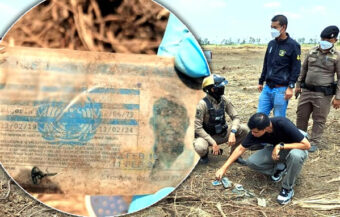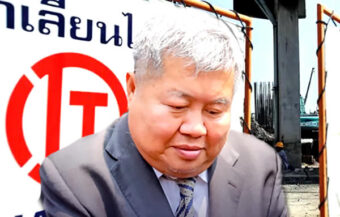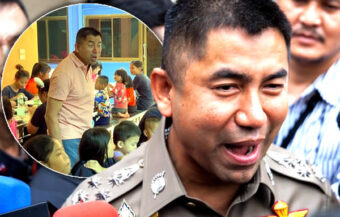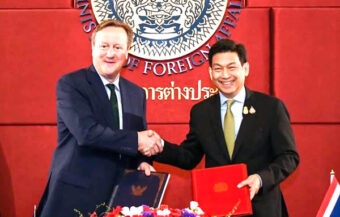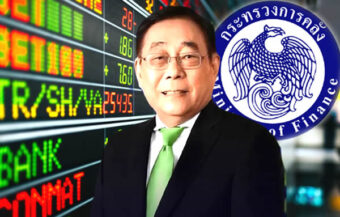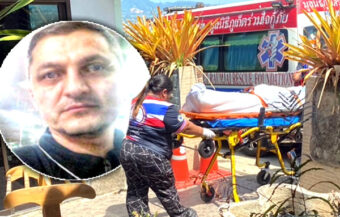Last month Panthongtae Shinawatra, the son of the exiled former Thai Prime Minister faced money laundering charges. The case was politicised by former supporters of Thaksin. Shortly afterwards, the emergence of a popular anti junta rap, suggested the emergence of a hostile climate but a refreshing response by authorities to the young artistes showed confidence. It highlights the delicate balance in Thailand that must be negotiated as moves forward towards democracy.
As Thailand enters into the final months before an election still set for February 24th 2019 political tension is, of course, rising. There are new parties, new faces and personalities and a new political story nearly every 48 hours. While the odds are on current Prime Minister Prayut Chan-o-cha winning the election under a new electoral system and constitution, a number of events both within and outside the world of politics are taking on added significance. It is important for Thailand and the Thai government that the election not only takes place but leads to a new era of peaceful and stable government. While the government and supporting parties have many of the ace cards, it appeared in recent weeks that more strident opposition to the junta and its programme was emerging when a team of young Thai artistes had a online hit with a song robustly critical of the military regime. The government’s response however was positively received and indicates that Thai people want to see a positive campaign without rancour.
In the middle of October the son of former Thai Prime Minister Thaksin Shinawatra was sent forward for trial on money laundering charges with a legal case that is imminent. The Thai government and officials have assiduously dismissed any suggestion that the prosecution is in any way linked to politics.The term within which the young man could have been prosecuted was due to expire under Thailand’s legal provisions or statutory limits. This did not deter some commentary from the opposition that the prosecution was politically motivated.
Authorities charting a tricky path to a new democratic era as cut and thrust of politics returns
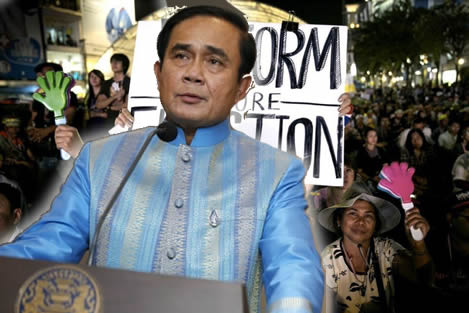
Then, at the end of October, a groups of rappers from Thailand’s burgeoning underground youth music scene openly challenged Thailand’s leaders who have, while in power, deftly and discreetly handled online opposition despite the the government’s sweeping powers including those under the Computer Crime Act. There has been some respect accorded to the regime by the use these powers in a careful manner. The rap song was quite vigorously critical the junta and reawakened painful memories of Thailand’s infamous 1976 crackdown on students in Bangkok. The song, highlighting student protests, topped the download charts with an online video receiving millions of views. While initially officials talked about prosecuting the young people, Thai authorities subsequently adopted a more understanding response. This successfully diffused the protest. It indicates the skill that Thai authorities are be required to exercise as the country charts it ways back to democracy and a new era in Thai politics as well as the still fragile nature of Thailand’s new sense of order and harmony since the junta came to power. This exercise will be all the more difficult when the cut and thrust of politics returns fully in December but is nevertheless essential.
Thai PM wants to boost awareness of the forthcoming election as public tentatively reengages
The Thai general election is set for February 24th next year. Prime Minister General Prayut Chan-o-cha has recently ordered government agencies to raise awareness among the Thai public in the run up to the 2019 election. Thailand’s Ministry of Interior and the Election Commission are reported to be working together to coordinate preparations for the poll as well as monitoring the activities of political campaigns. In the meantime the Thai public are beginning to focus again on politics as the election date seems now firmly set in place.
Thai PM and official pull off a PR coup in response to a critical hit rap song published online
The light touch that has made the military junta’s tenure so successful was evident in its response to the online success of the rap song which criticised it broad but profound terms. After initial warnings from some officials, the regime later emerged with a conciliatory approach to the rappers and the online hit. The same approach has been seen since 2014. While there have been examples of individuals prosecuted and jailed under Thailand’s draconian lese majeste laws the Thai government has generally used its powers to preserve order and peace sparingly.
Thailand’s most popular policeman and his comments helped diffuse the tension over the anti junta rap hit
Even Thailand’s most popular policeman, Generka Surachet Hakparn, now Head of the Thai Immigration Police came out and expressed a view that the song was an expression of an opinion and did not pose a threat to the national interest. The popular Thai policeman nicknamed ‘Big Joke’ by the media is highly visible in the kingdom. His activities are regularly featured in Thai news reports dealing with his fearless prosecution of ongoing crackdowns on bad guys in Thailand even exposing corruption in police ranks. The Prime Minister himself made similar comments on a visit to Phayao province in the north of Thailand. When asked about the controversy, he warned locals who came to meet him that they should be sceptical of ‘media buzz’. He asked if life under the junta had been all that bad? In truth, it has not been and that is why he is hotly tipped to lead the next government.
Result of recent opinion poll shows that Prayut still faces a challenge to become Prime Minister
A NIDA public opinion survey appeared at the same time as the controversy over the rap song. It seemed to suggest a tightening of public opinion. Surprisingly, it showed a very small majority opposed any potential candidacy by Prayut as the next prime minister but a significant minority just under 50% supported exactly such a proposition. Nearly two thirds expressed a belief that he would be the next prime minister of Thailand after the election. Such numbers would be a source of envy for many western political leaders and are remarkable given that fact that Prayut has lead Thailand since the 2014 coup which saw the military seize power and install a military led government with sweeping and draconian powers. It may also indicates that the Thai public do not want to see rancour in politics.
The Thaksin name is still in the news in Thailand – this time the ex PM and tycoon’s son facing money laundering charges
More than a decade ago, the tycoon turned prime minister Thaksin Shinawatra was deposed in the 2006 coup. He subsequently faced corruption charges which were closely linked to his energetic and turbulent management style. His son appeared before a Thai court in October and was granted bail of 1 million baht after he was indicted on charges of money laundering. Panthongtae himself declined to comment but his lawyer, Chumsai Sriyaphai, said that the exiled prime minister’s son denied any wrongdoing.
Charges relate to loan arrangement when Thaksin will still Prime Minister arranged through a state bank
Legal action against Panthongtae Shinawatra, who also goes by the nickname ‘Oak’, commenced last year when he was charged with involvement in fraudulent loans of 9.9 billion baht from the Krung Thai Bank, which is owned by the Thai state, during the time his father was still in power. Panthongtae was said to have received 10 million baht from the funds.
Prosecution of Thaksin son politicised
While the Thai government has strenuously pointed out that the prosecution is not political, the opposition took up the matter. Members of the Pheu Thai party, which is reported to be founded and still influenced by the Shinawatra family, claimed that the young man is innocent and simply failed to realize that the payment was illegal. Panthongtae could face up to 10 years behind bars and be the third member of the Shinawatra family to be convicted for that kind of charge.
Earlier this year, Thaksin’s sister, Yingluck Shinawatra, was given a 5-year prison sentence due to her financially devastating rice subsidy scheme though she had fled Thailand and joined her brother in England.
Critical months to deliver Thailand’s new democracy
The move comes as Thailand is entering into a critical few months in advance of the general election set for February 24th 2019. Although opinion polls show that current Thai PM Prayut Chan-o-cha could well be on target to be elected prime minister under Thailand’s new constitution. The new provisions allows both of Thailand’s parliamentary assemblies, the upper and lower house, to vote for the office of prime minister. It is also allowing for the selection an external candidate. Significantly the upper house or senate with 250 members is controlled by the military in Thailand.
Firebrand opposition leader doing well in polls
The incumbent government is facing some emerging challenges as the country gras up for a lifting of restrictions on politics in December. Opposition is coming the from the former ruling party prior to the 2014 coup, Pheu Thai and a new, even more radical, opposition grouping in the shape of the Future Forward party lead by political firebrand and entrepreneur Thanathorn Juangroongruangkit. This new party has emerged strongly in the polls considering that its is a new party only founded in March this year. The young businessman was interviewed by Thai police as a witness in July in relation to a Facebook broadcast. This followed an official complaints from the National Council for Peace and Order which is the official term for the current military junta which oversees the government in Thailand. The party has insisted that it will field 350 candidates in all constituencies and dismissed pundits who suggest that it only has a chance of electing MPs through the party list system which would reduce it to a relative minor force.
It is thought unlikely at this stage that the combined opposition parties can win or command over 375 seats in the new parliament. This would be necessary to elect a prime minister other than Prayut or whatever nominee emerges is put forward by the alliance of parties supporting the military and the military appointed senate or upper house.
February 24th 2019 still D Day for Thailand’s election
The government is still sticking to the February 24th date although any election must be held by May 2019 at the latest to comply with laws given assent by Thailand’s monarch in September after the bill had been passed by the current legislature. The law comes into effect in December 2018 and the election must be held within 150 days of that date meaning that theoretically it could extend to May 2019. However the current government leadership has insisted that the February 24th date for the election is final. Thailand’s Deputy prime Minister reiterated and confirmed this in the last month. The government has promised to open up the political arena by December to allow for an election campaign to run up to February 24th although no one doubts that the campaign is already underway even under present, restricted conditions.
Current Thai army chief defends the 2014 coup
General Apirat Kongsompong, Thailand’s new army chief, sparked some controversy among opposition groups on October 17th when he said that staging a military coup might be a solution when a news reporter asked him how to handle a political crisis similar to the one preceding the 2014 coup. The general, who happens to be the son of the general who spearhead a coup in 1991, stressed the need for peace and order, likening the situation to the way then-Gen Prayut Chan-o-cha dealt with the massive street protests and upheaval that surrounded the collapse of the Yingluck administration in 2014.
Opposition criticises the comments of Thailand’s military leader who defended the 2014 coup
General Kongsompong’s remarks drew a negative reaction from a number of high profile politicians and party leaders.The most vocal opposition perhaps came from Pheu Thai which condemned the army’s readiness to stage military coups as highly disruptive. Pheu Thai leaders warned that sch actions damage Thailand’s credibility and international standing, affecting adversely foreign investment and trade with global partners. However, it is clear that the goal of the new constitution and the steps undertaken by the Thai junta is to prevent future political deadlock in Thailand.
Thailand and world politics has changed considerably since 2014. European countries and America, who have in the past championed democracy and liberalism, have recently adopted a more pragmatic approach and come to view Thai military government as a reliable partner. This is also related to heightened political tensions in western countries since 2016 and the rise of populism and political polarisation brought about by the European migrant crisis. This was clearly shown at the recent summit meeting between European and Asian leaders held in Brussels where Prime Minister Prayut Chan-o-cha seemed to be quite at ease when meeting European leaders.
Election commission to investigate Pheu Thai party and its links to Thaksin a breach of the law
Thaksin Shinawatra is reported to be confident that the Pheu Thai party can win the Thai election in February. The charismatic ex PM has predicted that the party can win over 300 seats. The success of Thaksin and parties aligned with him in successive Thai elections means that it would certainly be a mistake to underestimate him.
Meanwhile, Thailand’s Election Commission has taken up calls to investigate Thaksin’s continued involvement with the Pheu Thai party. The Secretary General of that body, Jaroongwit Phumma, has indicated that the body has begun to look at the matter and were in the process of collecting evidence and information. The election commission will be examining the circumstances of the former Thai Prime Minister’s involvement and links to the opposition party to see if it constitutes an infringement of the Political Parties Act.
Hong Kong meeting central to the probe
It is reported that officials of the election commission are focusing on a controversial meeting between Thaksin and Pheu Thai party executives reported to have been held recently in Hong Kong. This includes media footage and videos of that meeting as well ongoing reports and coverage of Thaksin’s activities related to the election in Thailand.
The Secretary’ General’s comments on the matter were quite clear. ‘If wrongdoing was committed, the party involved risks being dissolved,’ he was reported as saying in The Nation newspaper. The election commission wants to determine if Thaksin is controlling, directing or ‘influencing’ the operations of the party and if this activity is in breach of the Political Parties Act which gives the commission sweeping powers. The new law specifically prohibits non members from exercising influence or directing political parties operating in Thailand.The act allows for those breaching the law to be jailed or be banned from Thai politics including provision for the dissolution of political parties that have been compromised.
The Secretary General also made it clear that the committee was examining all Thai political parties and is setting up a committee to look at any evidence that emerges based on the strength of that evidence.
Current Government Deputy Prime Minister, Prawit Wongsuwan, has made it clear that he feels that the election commission should look at the activities of the former PM and his links with the current Pheu Thai party and leadership. It is commonly known in political circles in Thailand, particularly those around Pheu Thai, that Thaksin is known as ‘Big Boss’.
Thaksin bullish about Pheu Thai’s prospects
Thaksin remains bullish about Pheu Thai’s prospects predicting over 300 of the 500 seats in the lower house of parliament would be won by Pheu Thai. The new leader of Pheu Thai, Police Lt General Viroj Pao-in has moved swiftly to counter any suggestion of impropriety and has claimed that Thaksin is not, in fact, connected with Pheu Thai. He told reporters that the former Prime Minister is simply a Thai man who maintained an interest in events in Thailand. He explained that members and politicians linked with Pheu Thai in Hong Kong were simply demonstrating personal respect for the exiled former leader. He differentiated this from the political party itself which he claims is separate from Thaksin. He expressed his opinion that there were no valid grounds for dissolving the political party.
On October the 28th Pheu Thai elected Viroj as its leader. It had been suggested, at one point, that another Shinawatra family member might emerge to take the position. The Pheu Thai party heads into the election with a strong lineup and surprisingly, with new talent. The strength of new candidates and political players that have emerged, even within the confines of the military regime and restricted political conditions, in respect of all Thai political parties is very impressive well and augurs very well for Thailand’s democratic future.
New talented politicians among both government and opposition parties augur well for Thailand
Pheu Thai, still one of the most influential parties in Thailand, despite many setbacks still retains strong political operators. One of them is Sudarat Keyuraphan, tipped as a potential leader before the election of Viroj Pao-in at the end of October. A polite and quietly spoken but determined politician with great communication and negotiating skills, she now represents one of the party’s biggest hopes in the coming election. She is one of many senior members in Pheu Thai who have considerable ministerial experience. Some of them have very high level of credibility, like Samak Sundaravej, while some have close connections with the Shinawatra family like Somchai Wongsawat. However, Sudarat Keyuraphan, dubbed ‘the Iron Lady’ by people close to her, has served in various government positions, such as agriculture minister, public health minister, deputy interior minister, to name a few. Her expertise and track record is without doubt.
Young politicians who simply wish to help Thailand
Another remarkable new face for Pheu Thai is Paopoom Rojanasakul who, during a recent talk with PBS, said he wanted to combine what he had with the capability of the party to do something good for the society. Having a similar outlook, Narit Paranulaksa, representing the new generation of Phalang Pracharat Party, which supports the incumbent prime minister, is another exciting name in Thai politics which is coming back to life.
It can only be hoped that after the election a stable government emerges and that Thailand does indeed discover a new politics not only without rancour but also one where all voices are heard. The depth of talent on both sides of the political divide, the current positive economy and exciting new initiatives demonstrate that Thailand could be on the verge of a positive leap forward. It would be a tragedy if the country takes a step back to the strife and division of the past.



